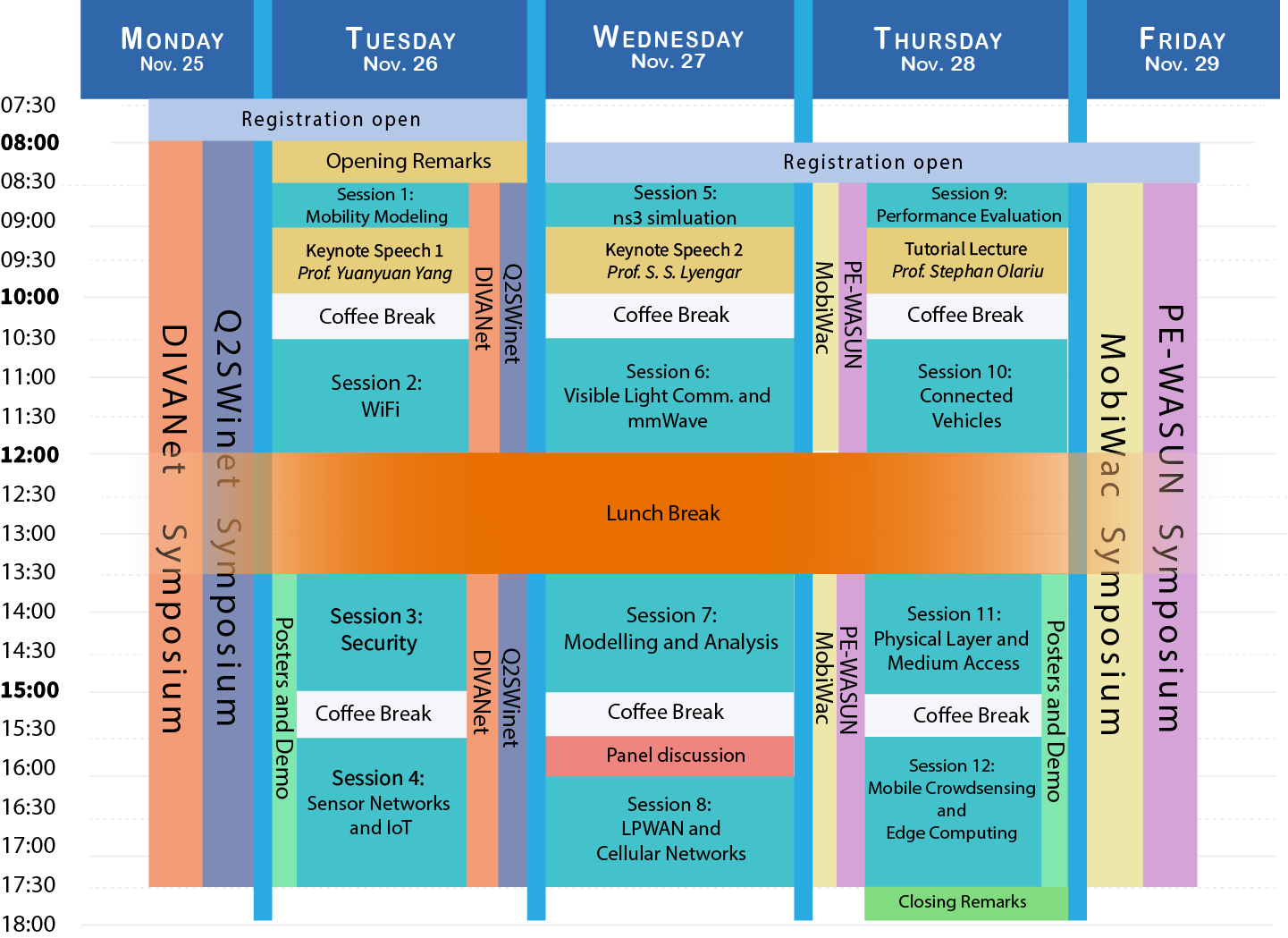Tentative Technical Program
Program at a glance

| Black = full paper (25-min oral presentation) / Red = short paper (15-min oral presentation) |
Monday, November 25
All Day
Concurrent Symposia I
Tuesday, November 26
8:00 - 8:15
Welcome Opening Address
All Day
Concurrent Symposia II
8:15 - 9:00
Session 1: Mobility Modeling
- Where Are You Going Next? A Practical Multi-dimensional Look at Mobility Prediction
- Stationarity for the Small World in Motion Mobility Model
9:00 - 10:00
Keynote Speech 1
10:00 - 10:30
Coffee break
10:30 - 12:00
Session 2: WiFi
- Dynamically Tuning IEEE 802.11's Contention Window Using Machine Learning
- Simulation and Performance Evaluation of the Intel Rate Adaption Algorithm
- Optimal Access Point Placement for Multi-AP mmWave WLANs
- 802.11ac Frame Aggregation is Bottlenecked: Revisiting the Block ACK
12:00 - 1:30
Lunch break
1:30 - 3:00
Session 3: Security
- A Transparent and Multimodal Malware Detection Method for Android Apps
- A Comprehensive Empirical Analysis of TLS Handshake and Record Layer on IoT Platforms
- Secrecy in Dual-Hop Relaying Network Using the Independent Randomize-and-Forward Strategy
3:00 - 3:30
Coffee break
3:30 - 5:30
Session 4: Sensor Networks and IoT
- Three-Dimensional Matching based Resource Provisioning for the Design of Low-Latency Heterogeneous IoT Networks
- Received Total Wideband Power Data Analysis: Multiscale wavelet analysis of RTWP data in a 3G network
- Toward accurate clock drift modeling in Wireless Sensor Networks simulation
- HiPR: High-Precision UWB Ranging for Sensor Networks
- Maximum Gaps in Path Coverage
Wednesday, November 27
8:15 - 9:00
Session 5: ns3 Simulation
- ns-3 meets OpenAI Gym: The Playground for Machine Learning in Networking Research
- A Simulation Execution Manager for ns-3
9:00 - 10:00
Keynote Speech 2
10:00 - 10:30
Coffee break
10:30 - 12:00
Session 6: Visible Light Communication and mmWave
- VuLCAN: A Low-cost, Low-power Embedded Visible Light Communication And Networking Platform
- Performance Evaluation of LED-to-Camera Communications
- Joint Link-level and Network-level Reconfiguration for mmWave Backhaul Survivability in Urban Environments
12:00 - 1:00
Lunch break
1:00 - 3:00
Session 7: Modelling and Analysis
- Follow the Rays: Understanding the Interplay between Environment and System through In-Situ Wireless Modelling
- Analysis of Age of Information threshold violations
- Stochastic Modeling and Simulation for Redundancy and Coexistence in Graphs Resulting from Log-Normal Shadowing
- DCTP-A and DCTP-I: Collection Tree Protocols for Dual Radio Platforms
3:00 - 3:30
Coffee break
3:30 - 4:30
Panel discussion
4:30 - 5:30
Session 8: LPWAN and Cellular Networks
- Spatial Issues in Modeling LoRaWAN Capacity
- Evaluation of LoRaWAN Transmission Range for Wireless Sensor Networks in Riparian Forests
- Performance of a Cell-Free MIMO Under RF Mismatch
Thursday, November 28
All Day
Concurrent Symposia III
8:15 - 9:00
Session 9: Performance Evaluation
- Experimental Evaluation of Antenna Polarization and Elevation Effects on Drone Communications
- Simulation of ISO/IEEE 11073 Personal Health Devices in WBANs
9:00 - 10:00
Tutorial Lecture: TBA
10:00 - 10:30
Coffee break
10:30 - 12:00
Session 10: Connected Vehicles
- A Byzantine-Tolerant Distributed Consensus Algorithm for Connected Vehicles Using Proof-of-Eligibility
- Towards data VSN offloading in VANETs integrated into the cellular network
- Characterizing Car Trips Through Information Theory Metrics
- COLiDeR: A Cross-Layer Protocol for Two-Path Relaying
12:00 - 1:30
Lunch break
1:00 - 3:00
Session 11: Physical Layer and Medium Access
- LAMA: Location-Assisted Medium Access for Position-Beaconing Applications
- Multi-Access Spreading over Time: MAST
- Benchmarking the Physical Layer of Wireless Cards using Software-Defined Radios
- SEE: Scheduling Early Exit for Mobile DNN Inference during Service Outage
1:30 - 3:00
Tutorial
3:00 - 3:30
Coffee break
3:30 - 5:30
Session 12: Mobile Crowdsensing and Edge Computing
- CrowdSenSim 2.0: a Stateful Simulation Platform for Mobile Crowdsensing in Smart Cities
- An In-depth Analysis of Battery Usage Patterns on Performance of Task Allocation Algorithms in Sparse Mobile Crowdsensing
- Elastic Offloading of Multitasking Applications to Mobile Edge Computing
- Modeling Realistic Bit Rates of D2D Communications between Android Devices
- Secure Routing in Multi-hop IoT-based Cognitive Radio Networks under Jamming Attacks